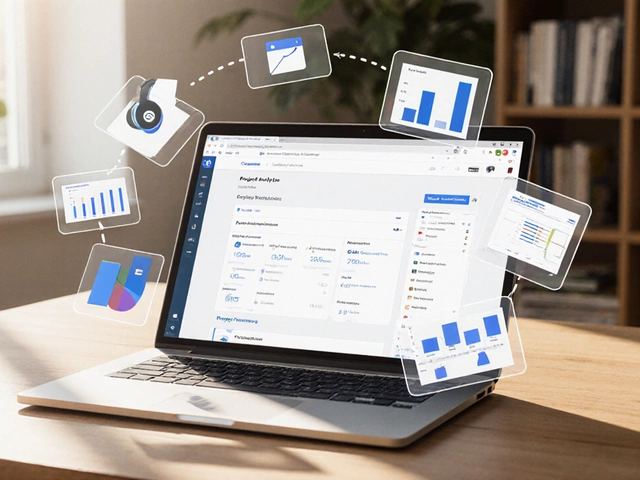
Picking between an IT degree and tech certificates is kind of like choosing between a marathon and a sprint—both can get you to the finish line, but the path (and the pace) looks totally different. In India’s job market, this choice isn't just about what you learn, but also how fast you can get hired, what companies actually want, and how much cash you’re willing to spend upfront.
Degrees have always been the traditional route, and if you want to aim for big-name employers or climb into management roles, a full BTech or MCA still holds a lot of weight. But here’s the interesting part—a lot of hiring managers now check out specific certificates when they need someone to handle hot tools like AWS, Google Cloud, or cybersecurity systems. Some companies care more about your hands-on skills than the classroom hours you've racked up. I was shocked last year when my cousin landed a high-paying job with just two Google certificates and a killer GitHub profile.
So, what really matters—proving you can stick it out through four years of college, or showing you can build an app or automate a process right now? With job descriptions in India getting more specialized every year, there’s no one-size-fits-all answer. Stick around and I’ll break down how both choices stack up. If you’re just starting out in IT—or you’re figuring out how to switch tracks without losing momentum—there’s a lot to think about beyond the hype.
- The Basics: Degree vs Certificates
- What Indian Employers Really Want
- Money, Time, and ROI
- Flexibility and Learning Styles
- Real World Examples
- How to Choose What’s Right for You
The Basics: Degree vs Certificates
When you talk about an IT degree in India, you usually mean a BTech, BE, or MCA from a recognized university. These courses take three to four years to finish. Besides technical stuff, you get theory, maths, projects, campus placements, and sometimes even those never-ending semester exams. The main thing? A degree is often seen as proof of commitment and well-rounded knowledge.
On the other hand, IT certificates get straight to the point. You pick a skill—like Python, AWS, networking, or ethical hacking—and go deep into it. Instead of years, you might get certified in a few weeks or months. Many big tech companies (like Microsoft, Cisco, AWS) run their own certification programs and update them fast when tech changes. You can even do most of them online without stepping out of your house.
- IT degree: General foundation, 3-4 years, cost: ₹1-10 lakh, mix of core and electives
- IT certificates: Skill-specific, a few weeks/months, cost: ₹5k-50k, mostly practical
Now, recruiters take both seriously—but for different reasons. If you’re dreaming about a tech gig at a government agency or a classic campus recruitment drive at the big MNCs, a degree is often expected. But certificates let you pivot fast. Get certified in cloud computing and you’re instantly more interesting to startups or companies using those tools right now.
Check out this quick comparison to see the main differences:
| IT Degree | IT Certificates | |
|---|---|---|
| Duration | 3-4 years | 1 week to 6 months |
| Cost (India) | ₹1-10 lakh | ₹5,000-50,000 |
| Focus | Broad, theory + practice | Specific, hands-on |
| Recognition | More formal, often required | Skill-based, trendy in startups |
Degrees and certificates serve different needs. It’s like deciding if you want a Swiss Army knife or that one fancy kitchen knife your mom swears by—both have their place depending on what you're actually solving for. The rest of the article will show where each shines brightest in India’s technology jobs market.
What Indian Employers Really Want
Everyone thinks you need a full-on IT degree to get noticed in tech, but the reality on the ground is changing fast—especially in India. Walk into a big company like Infosys or TCS, and their HR teams do still lean toward degrees for fresher roles. It’s part habit, part company rule. But scan recent job listings on sites like Naukri or LinkedIn, and you’ll see more demand for hands-on skills than pure paper qualifications nowadays. Hiring managers are asking for certifications in AWS, Microsoft Azure, data analytics, or even security tools, sometimes right in the job title.
Here’s what’s really going on behind the scenes. When companies are ramping up for massive projects, they just want people who can hit the ground running. That’s where IT certificates shine. If you’re going for roles like Cloud Engineer, Data Analyst, or Cybersecurity Specialist, the candidate with current, relevant certificates often gets an edge—even over someone with a broader, older degree. Surveys from TeamLease and CutShort in 2023 showed nearly 60% of recruiters in tech hubs like Bengaluru, Hyderabad, and Pune prefer candidates who can show work-ready skills with certificate courses India recognizes.
Need proof? Check out this quick view:
| Company Type | Degree Required? | Certificates Asked? | Skill Test/Practical? |
|---|---|---|---|
| Big IT Service Co (e.g. TCS, Infosys) |
Usually Yes (except for contractors) | Sometimes, for niche jobs | Occasionally |
| Product Startups (e.g. Swiggy, Razorpay) |
No, if project skills proven | Often | Yes, almost always |
| SMEs & Agencies | Not strictly | Yes, relevant ones | Usually |
Another trend is live coding or project rounds in interviews. Indian employers want to see what you can actually build, automate, or debug. That’s why they’re starting to favor candidates with GitHub repos or portfolios linked with their certificates. It basically shifts the focus from just theory to things you’ve actually done.
- If you’re applying to a traditional IT giant—degrees still matter for freshers, but certificates help you switch domains or get specialized roles (like DevOps or AI).
- Startups and new-age companies? They couldn’t care less about your university if you can show relevant certificates and projects.
- Government tech jobs are still mostly degree-driven. But even PSU teams are warming up to the idea of specialized certificates, especially for contract or consultant gigs.
So, bottom line: Indian employers want proof that you can do the job now—not just proof you studied hard a few years back. Mix practical certificate courses India offers with strong projects, and you’re golden.
Money, Time, and ROI
This is where things get real. If you look at the cash and time you put in for an IT degree versus IT certificates, the gap gets pretty wide. Degrees like BTech or MCA can cost anywhere from ₹3 to ₹15 lakhs in India, depending on the college. Add that to the 3-4 years you’ll spend, and it’s a big commitment.
On the flip side, certified courses—whether it’s a CompTIA, AWS, or a Google IT Support certification—often cost less than ₹50,000 each. Many are finished in a few weeks or months. This speed means you can get into the job market faster or stack new skills when tech trends change.
| Path | Average Cost (INR) | Typical Time Needed |
|---|---|---|
| IT Degree | ₹3,00,000 - ₹15,00,000 | 3-4 years |
| IT Certificate | ₹10,000 - ₹50,000 per certificate | 1-6 months per certificate |
What about salary? A fresh IT graduate might land between ₹3 and ₹8 lakhs CTC, depending on the college and company. But getting a certificate in a trending field—like cloud computing or cybersecurity—can sometimes help you leapfrog into a ₹5-6 lakh job, especially if you prove your skills with real projects. Of course, some big MNCs stick to degree requirements for entry-level roles, but more startups and SMEs are willing to look at actual skills these days.
So, the ROI (return on investment) boils down to a few things:
- Cost upfront: Degrees need more money and time up front; certificates let you pay and learn as you go.
- Job readiness: Certificates can prep you for specific roles really fast—like if you want to become a network admin, a CompTIA cert can get you ready in three months.
- Long-term growth: Degrees can help if your goal is management or higher studies later. Certificates are great for upskilling and quick wins but might need updating more often as tech evolves.
If you’re tight on budget but need quick entry into IT, certificates are hard to beat for value. But if you want the traditional campus life, networking, and that all-important degree for bigger companies, a university might be a better fit. Your personal situation makes all the difference here.

Flexibility and Learning Styles
If you've ever tried cramming for exams while juggling a side gig, you know how rigid most college schedules can feel. That’s one of the biggest differences between a classic IT degree and modern IT certificates in India—flexibility. With a degree, you’re locked into a set timetable, mandatory attendance, and core subjects that may not match up with what’s actually trending in tech jobs.
Certificates totally flip that model. You get to choose when and how you learn. Most popular certificate courses in India—like those from Coursera, Udemy, or NPTEL—let you pause, rewind, and speed up lessons. Missed a chunk because your dog demanded a walk or your boss called in for a shift? No problem. You work at your own pace and can even complete many certificates in just a couple of months if you put your mind to it.
- If you learn better by doing, certificate courses usually come with hands-on projects that let you actually build stuff or solve practical problems rather than just reading about them.
- Prefer group learning and classroom debates? Traditional IT degrees in India still win here, since you get to interact with professors and a steady batch of classmates face-to-face.
- Need to change directions quickly—say, you spot a hot new skill on technology jobs boards? Certificates let you jump in, pick up that single skill, and move on fast.
Here’s something you might not expect: A 2023 survey by Nasscom showed that over 58% of Indian tech professionals took some sort of online certificate course after graduation. Why? They wanted a fast upgrade without going back to college full-time. That kind of flexibility is gold if you’re balancing a job, a family, or even prepping for that surprise coding test most startups like to throw your way these days.
Here’s a quick comparison:
| Path | Mode | Duration | Can Pause/Resume? |
|---|---|---|---|
| IT Degree | Full-time (mostly on campus) | 3-4 years | No |
| IT Certificate | Online/self-paced | 2 weeks to 6 months | Yes |
Bottom line: If you value flexibility, hands-on experience, and the freedom to shape your own path, certificates have a clear edge. But if you thrive in a tightly structured and social environment, a degree might feel more comfortable, even if it takes a lot longer. Just think about how you actually learn best before deciding where to spend your time and money.
Real World Examples
Let’s look at how actual people land IT jobs in India using a mix of degrees and certificates. You’ll see there’s no single path—lots depends on the kind of company, the role, and what hiring managers value in a candidate.
Take Tata Consultancy Services (TCS), one of the largest IT employers in India. They still expect candidates for their entry-level IT jobs to have a IT degree like a BTech or MCA. But for specialized roles, especially in areas like cybersecurity or cloud, having a few industry-recognized IT certificates (think AWS Certified Solutions Architect or CompTIA Security+) can let you skip ahead in the selection process. Infosys and HCL run similar setups—degrees for freshers, but they grab experienced folks based on what certificates they have and what projects they’ve handled.
On the flip side, startups don’t care too much about degrees if you can prove you’ve got the skills. I know a guy who got hired by a Bengaluru fintech startup simply by showing off his Udemy certificate in data analysis and a strong portfolio on GitHub. For quick upskilling, certificate courses like Google IT Support Professional or Microsoft Azure Fundamentals are serious resume boosters. These certificates take months, not years, and cost way less than a full degree.
Here’s something else—according to Naukri.com’s 2024 data, nearly 35% of mid-level IT job postings in India asked for specific certificates alongside, or sometimes even instead of, a degree. Check this out:
| Company | Preferred for Entry (degree/certificate) | Quick Upskill Option |
|---|---|---|
| Infosys | Degree (BTech/MCA) | AWS, Salesforce, Data Analytics certificates |
| TCS | Degree | Cloud, Cyber Security certificates |
| Zoho | Either, portfolio matters more | Front-end/Back-end certificates |
| Razorpay | Projects + certificates | Python, DevOps courses |
If you’re in a rush to change careers or get a promotion, certificates can help a lot. But for leadership roles or overseas opportunities, companies still lean on degrees. The sweet spot? Mix both: a solid degree plus job-focused certificates means you don’t get filtered out and you stand out as well.
How to Choose What’s Right for You
Here’s where things get real—choosing between an IT degree and IT certificates isn’t just about what looks good on your resume. You’ve got to match it up with your goals, what you can afford, and how fast you want to start working. Let’s break it down step by step so you can see what fits your style.
- What do you want to do? If your dream is to snag a developer job at Infosys, TCS, or a similar big fish, they’ll usually ask for a recognized IT degree. These companies still trust traditional degrees for fresher roles and campus placements. On the other hand, if you’re eyeing startups, freelance gigs, or international contracts, IT certificates—especially those with hands-on labs or live projects—can open doors fast.
- How fast do you need to start earning? A full degree eats up three to four years. Most certificate courses India options take anywhere from a few months to a year. If you need to get into the workforce—maybe support your family or just don’t want to stay a student forever—certificates can get you job-ready in a quarter of the time.
- Budget reality check. Private colleges can cost ₹5-10 lakh for an IT degree, while even government seats don’t come for free. In comparison, a Microsoft or AWS certificate might set you back between ₹10,000 and ₹40,000 each. If money’s tight, stacking up a few well-chosen certificates can be much lighter on your wallet.
- Are you hands-on or theory-focused? Degrees go deep on theory and cover topics broadly—even ones you might never use on the job. Certificates stay laser-focused on real-world tools and practical skills, so if you learn by doing, you’ll probably vibe more with certificate paths.
Here’s a quick look at how things break down for Indian job hunters:
| Factor | IT Degree | IT Certificate |
|---|---|---|
| Typical Duration | 3-4 years | 2-12 months |
| Average Cost | ₹5-10 lakh | ₹10,000-₹40,000 |
| Entry-level Salary | ₹3-6 LPA | ₹2-5 LPA |
| Preferred By | Large IT firms, MNCs | Startups, tech consultancies |
| Growth Path | Management, R&D, stable roles | Specialist roles, fast domain shifts |
Don’t forget your learning style. If you’re juggling a day job (or a needy dog like Bruno, who always wants to play fetch during Zoom classes), online certificates let you pace things out on your own schedule. Degrees are less flexible—think fixed classes, assignments, the whole campus routine.
One last tip: see what jobs are trending on Naukri, LinkedIn, or Glassdoor. Check what skills are actually showing up in job postings (cloud, data science, cybersecurity), and if companies ask for specific certificates or mention degree requirements. This kind of research can save you a lot of time and help you avoid investing in the wrong path.




